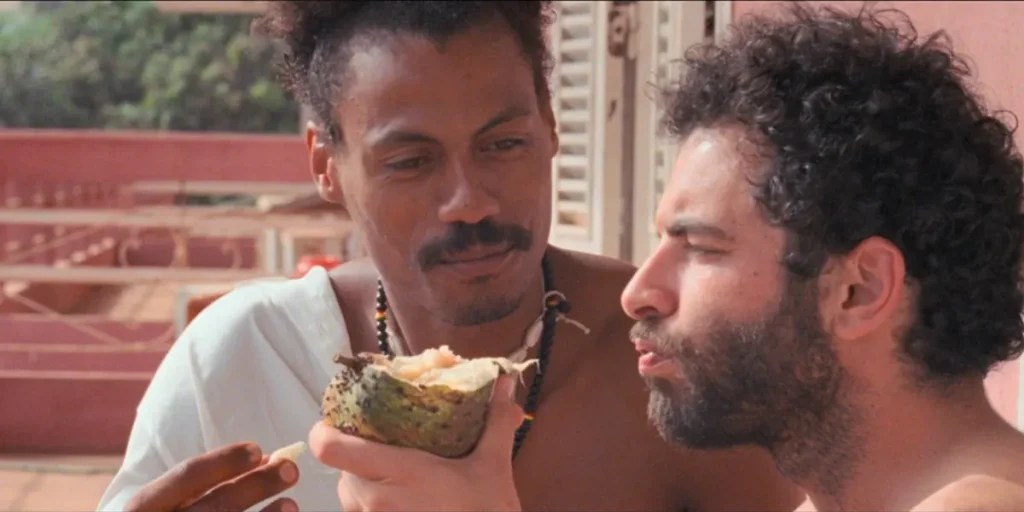A Portuguese environmental engineer travels to Guinea-Bissau in I Only Rest In The Storm, which is as fascinatingly intricate as it is overly long.
Writer & Director: Pedro Pinho
Original Title: O Riso e a Faca
Genre: Drama
Run Time: 211′
Cannes Premiere: May 17-18, 2025 (Un Certain Regard)
Release Date: TBA
Where to watch: Salle Debussy, Salle Bazin
The first thing you feel when I Only Rest In The Storm (O Riso e a Faca) begins is the searing heat of its setting. As Sérgio (Sérgio Coragem, Damned Summer), an engineer from Portugal, arrives in the desert of Guinea-Bissau, the sizzling temperature almost jumps off the screen. It is a potent, flammable atmosphere that sets the tone for the rest of this film, which runs at a mammoth 211-minutes and, via three main characters, tracks the thorny history of European colonialism in Western African countries such as Guinea-Bissau.
The chunky runtime might be warranted considering the vast and difficult subject matter, but too often director/writer Pedro Pinho (The Nothing Factory) wastes time with dull filler. Nevertheless, the intelligent points that crop up throughout the screenplay make this an experience worth having.
From the off, the fact that I Only Rest in the Storm is told largely from a white Portuguese man’s perspective is worrying. Will this be another film that shoves the perspective of African people to the margins in favour of, yet again, a white European’s viewpoint? Thankfully, Pinho avoids this, firstly by crafting strong co-lead characters in Bissau-Guinean local Diara (Cleo Diára, Entroncamento) and Brazilian Guillermhe (Jonathan Guilherme), and secondly by constantly challenging Sergio’s actions and views. On the face of it, he’s a good guy, as a character says to him in one of the film’s best scenes, but this might make it even worse.
Sure, he has a job that offers aid to communities and people in Africa, but when everything in the world has been tainted by colonialism and racism, his actions take on an uglier tone. His complicity is inherited; everything in his life—specifically that of a white male European—has links to this dark past. I Only Rest in the Storm patiently introduces this trio of characters to each other (Diara and Guillermhe are already close friends), and the drama and ambiguity of their relationships is consistently fascinating. The screenplay is stacked full of fiery moments with grand statements that feel embedded in real life, as opposed to just being mere slogans.

The dynamics of their relationships, specifically between Sergio and each of Diara and Guillermhe, are inevitably complex. Whether they like it or not, their identities have been shaped by a capitalist, post-colonial world. One of the highlight moments of I Only Rest in the Storm is when Diara angrily confronts Sergio after he refuses a bribe of $150,000 on grounds of morality. For him, it is a choice he can make; for Diara, she would not even have that choice, as she would only be driven by the necessity to accept the money.
For all of these unforgettable moments, I Only Rest in the Storm is stuffed with a lot of filler. Some of it is necessary—the lengthy set-up, for example, intriguingly shows Sergio’s arrival in the country—but a large portion of it is drudgery. Pinho shows as many moments of great focus as he does looseness and vagueness. The film particularly stutters in its latter stages, as Diara and Guillermhe seem to be sidelined in favour of an ambiguous and meandering stretch solely focussing on Sergio.
However, these more testing parts are never enough to detract from the overall experience of I Only Rest in the Storm. The film isn’t afraid to recognise Sergio as a white man from Europe, and it’s all the better for it. Even Guillermhe isn’t immune to confrontation, with his Brazilian roots being called out by a local, who claims that, because of colonisation, Guillermhe isn’t Black, but white. When the blood of history is this soaked into every part of life and society, the hope for a future of equality is difficult to imagine. Pinho isn’t defeatist, but he is realistic in how he recognises how drastically the past shapes and controls the present and future.
I Only Rest in the Storm: Movie Plot & Recap
Synopsis:
An environmental engineer from Portugal joins a road-building project in Guinea-Bissau. His new friendships and experiences force him to face the colonial history of both his home country and this new one.
Pros:
- Some excellent moments of complex clarity surrounding capitalism and colonialism
- Fascinating power dynamics between the three main characters
Cons:
- A large amount of filler in between the more potent moments
- The narrative is loose and at times unfocussed
I Only Rest in the Storm premiered at the Cannes Film Festival on May 17, 2025, in the Un Certain Regard strand, and will be screened again on May 18.

